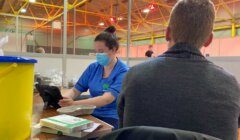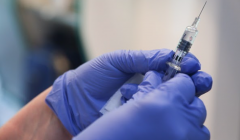Health / NHS offers advice on winter illnesses
Health officials have given information on scarlet fever in children, as well as norovirus
NHS Shetland has issued advice around winter bugs and illnesses as the festive season approaches.
Health officials reminded folk that as there are no Covid restrictions in place, people are more likely to be susceptible to other winter bugs that have not been so common of late.
Public health principal Elizabeth Robinson highlighted the recent increase nationally in infections caused by bacteria called Group A Strep (GAS) across the UK, particularly scarlet fever in children.
“Cases of GAS usually increase during the winter with peaks every three or four years,” she said.
“Social distancing measures implemented during the pandemic may have interrupted the usual cycle and explain the current high numbers.
“Scarlet fever used to be a very serious illness, but nowadays most cases tend to be mild. However there is a small risk of the infection spreading to other parts of the body and causing more serious infections.”
Scarlet fever usually affects children under the age of ten and it is rare to get it more than once. The initial symptoms of scarlet fever usually include a sore throat, headache and a high temperature (38.3C/101F or above), flushed cheeks and a swollen tongue.
A day or two later the characteristic pinkish rash appears. It usually occurs on the chest and stomach before spreading to other areas of the body, such as the ears and neck. The rash feels like sandpaper to touch and it may be itchy.
On darker skin the rash may be more difficult to see although its rough texture should be apparent. The infection is spread from person to person by breathing in airborne droplets, or touching skin and other surfaces.
Handwashing and good respiratory hygiene can help prevent spread. If someone thinks they or their child may have scarlet fever, they should contact their GP practice for a proper diagnosis and appropriate treatment with antibiotics if necessary.
Become a member of Shetland News
Liquid antibiotics, such as penicillin or amoxicillin, are often used to treat children. These must be taken for ten days, even though most people recover after four to five days.
After taking antibiotics for 24 hours people will no longer be infectious, but they need to stay at home until then. There is no evidence to suggest that catching scarlet fever when pregnant will put the baby at risk.
However, if someone is heavily pregnant, they should tell their midwife if they have been in contact with someone who has scarlet fever. There is more information about scarlet fever on the NHS Inform website.
Robinson also noted: “Most other winter infections are caused by viruses including flu, Covid and the viruses that cause the common cold.
“You can help to protect yourself and your family from these infections by continuing with the same simple precautions that we used for Covid: good hand hygiene; use disposable tissues and wash hands after coughing and sneezing; good ventilation where possible; use face coverings in crowded public settings; stay away from other people if you are unwell with symptoms of respiratory infection.
“Vaccination is the best way to protect yourself against serious illness due to flu or Covid.”
There is more information on NHS Inform about Covid symptoms, including when to seek medical advice.
Flu and covid vaccinations are still available to those who are eligible. To find out more and to check eligibility visit here.
There will be walk-in vaccination clinics at Gilbertson Park over the next two weeks until 15 December, and folk are asked to check the NHS Shetland website for details.
To book an appointment call the voicemail service on 01595 743319 or email shet.vaccination-team@nhs.scot . Appointments will continue to be available into next year.
Other viruses cause diarrhoea and vomiting, the most well-known being norovirus or the “winter vomiting bug”.
It usually clears up by itself in a few days. Norovirus spreads very easily and can be serious for people who are frail or have other health conditions.
People can help prevent spread by good handwashing with soap and water (alcohol hand sanitiser is not very effective against norovirus) and staying at home for at least 48 hours after your symptoms have stopped.
More information on protecting young ones this winter can be found here.
Become a member of Shetland News
Shetland News is asking its readers to consider paying for membership to get additional perks:
- Removal of third-party ads;
- Bookmark posts to read later;
- Exclusive curated weekly newsletter;
- Hide membership messages;
- Comments open for discussion.
If you appreciate what we do and feel strongly about impartial local journalism, then please become a member of Shetland News by either making a single payment, or setting up a monthly, quarterly or yearly subscription.



















